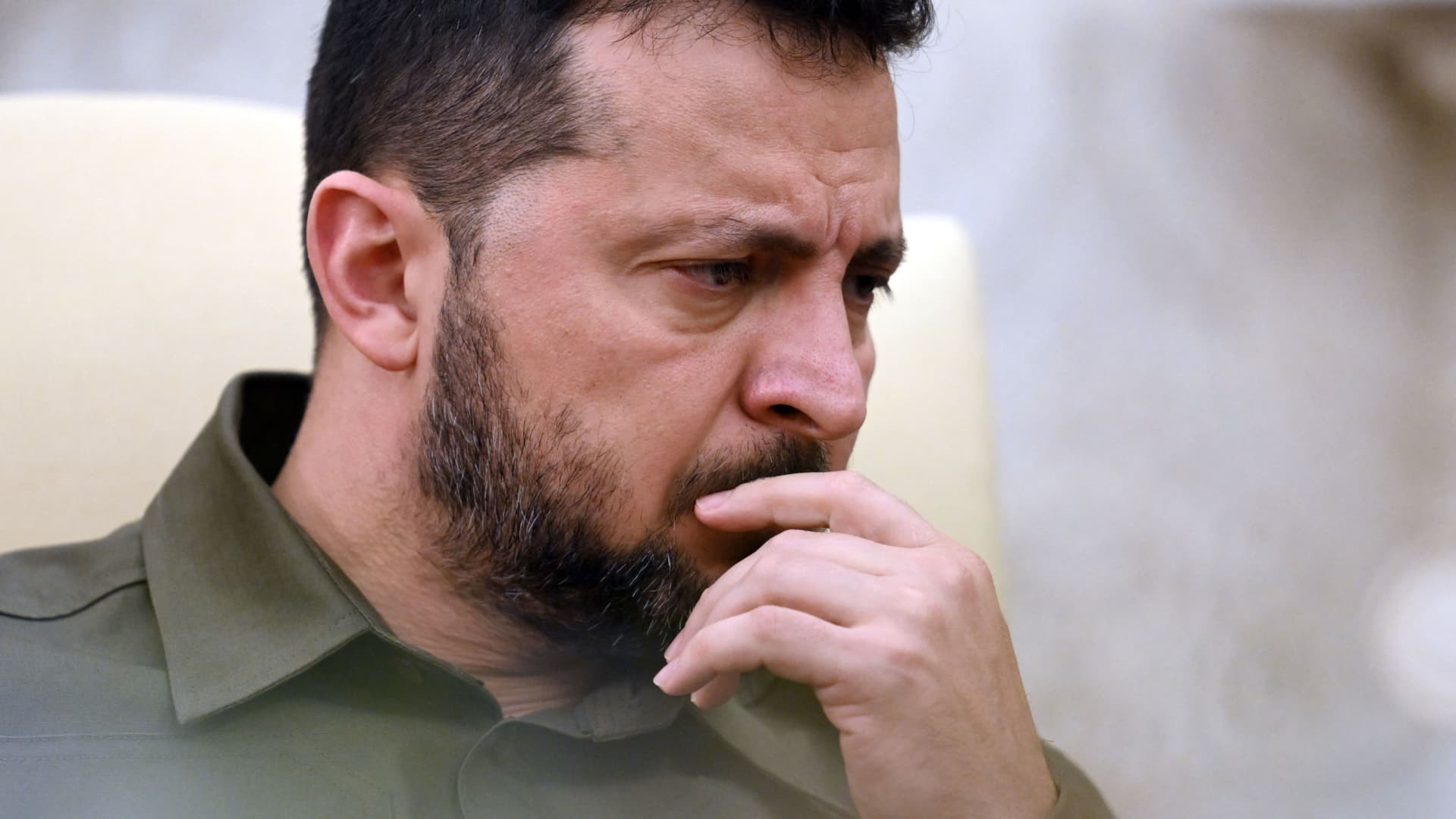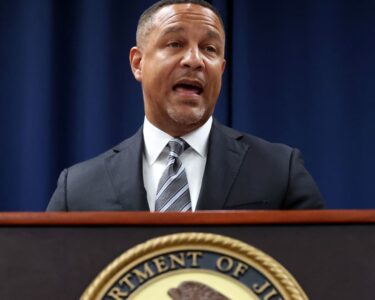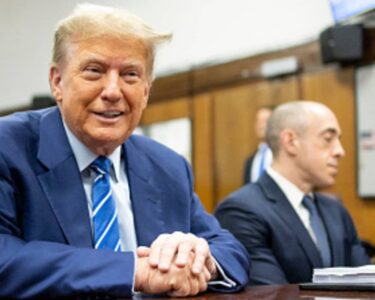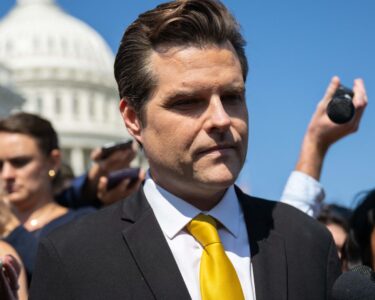This was CNBC’s live blog tracking developments on the war in Ukraine. See below for the latest updates.
The world is watching closely as Russian President Vladimir Putin and his Chinese counterpart and “dear friend” Xi Jinping meet at China’s Belt and Road forum in Beijing.
Putin and Xi described the relationship between their countries as having “no limits,” with “no ‘forbidden’ areas of cooperation” in a statement in February 2022. The countries deepened ties in recent years.
There are also reports that Russia is revoking ratification of a nuclear test ban treaty because it does not approve of the United States’ attitude toward global security, Reuters reported. Putin said on Oct. 5 that he would not say whether or not Russia should resume its nuclear testing.
Meanwhile, Ukrainian forces reported having struck Russian military resources near the cities of Luhansk and Berdiansk, which Russia disputed.
President Joe Biden is planning to submit a request for $100 billion in supplemental funding to Congress in the coming days that would include money for Israel, Taiwan, Ukraine and U.S. border security, two people familiar with the discussions told NBC News.
One source said the details of the package have not been finalized and could still change. The president is expected to send his request to lawmakers by the end of this week after he returns from his Middle East trip.
— NBC News
Ukraine fired long-range ATACMS missiles for the first time after they were delivered by the U.S., Ukraine’s Volodymyr Zelenskyy said in his nightly address Tuesday.
“Today, special thanks to the United States. Our agreements with President Biden are being implemented. They are executed very accurately, ATACMS have proven themselves,” he said, according to a Google translation of a transcript.
Ukrainian politician Oleksiy Goncharenko posted on social media: “ATACMS is already with us. The airfield in Berdyansk with enemy equipment was hit by them. Thanks to our partners!”
The Wall Street Journal reported the news earlier Tuesday, citing people familiar with the matter.
A U.S. State Department spokesperson told CNBC it was unable to confirm the reports.
Ukraine has repeatedly said ATACMS are important to advance its difficult counteroffensive in Russian-occupied areas. The missiles can strike targets from as far away as about 180 miles.
However, U.S. officials previously said the U.S. does not have a large stockpile of excess ATACMS, while some have expressed fears use of the weapons could escalate the conflict.
— Jenni Reid
Russian President Vladimir Putin told his Mongolian counterpart Ukhnaagiin Khurelsukh on Tuesday that he believed the Power of Siberia 2 pipeline project to bring Russian gas to China via Mongolia would move ahead at a “good pace”.
Russia has increased energy supplies to China, the world’s second-largest consumer of oil after the United States, as the west has imposed sweeping economic sanctions on Russia over its actions in Ukraine.
It already supplies natural gas to China via the Power of Siberia pipeline, and hopes to secure a major deal to bring another 50 billion cubic metres (bcm) a year via Power of Siberia 2. However, the talks have been long and painstaking as the key issues, such as the price of the gas, remain elusive.
“Everyone agrees with this project, all parties want to participate, want to work. It’s a matter of implementation. I think we will move at a good pace,” Putin told the Mongolian president in Beijing, where they were taking part in a conference on China’s Belt and Road Initiative.
The Kremlin has said it does not expect any oil or gas deals to be clinched during Putin’s visit and his meetings with Chinese leader Xi Jinping this week.
The Power of Siberia pipeline began supplying gas to China in late 2019.
It carried 10.5 bcm in 2021 and 15.5 bcm this year, and is due to supply 38 bcm a year by 2025, under a 30-year contract worth more than $400 billion.
— Reuters
Russian President Vladimir Putin arrived in Beijing Tuesday morning for China’s Belt and Road summit, where he joined a welcome ceremony and met with various world leaders before attending an evening banquet.
Putin was pictured being greeted by China’s President Xi Jinping, before holding sideline meetings with Hungary’s Viktor Orban — a former ally of Putin’s who has been a frequent critic of EU santions against Russia, and is the only leader from the bloc attending the event — and Thailand’s new prime minister, Srettha Thavisin.
Energy will be high on Putin’s conversational agenda as he schmoozes with various delegations on his first trip outside the former Soviet Union since the International Criminal Court put out a warrant for his arrest in March. He refrained from attending the BRICS leaders’ summit in South Africa in August amid questions over how ICC signatory South Africa would have responded.
Russia has brought a large delegation including the chiefs of state oil and gas giants Rosneft and Gazprom, though a senior presidential advisor said Monday no major deals were expected to be signed.
— Jenni Reid
A U.S. official described relations between North Korea and Russia as “very worrying” after the White House said Friday that North Korea provided military equipment to the Kremlin.
The U.S. special representative for North Korea, Sung Kim, said that weapon deliveries between the two countries are “dangerous” and “destabilizing,” as he spoke to reporters after meeting his South Korean and Japanese counterparts in Jakarta, Reuters reported.
The meeting occurred after the U.S. said North Korea delivered 1,000 containers of equipment and munitions to Russia for use in the Ukraine war Saturday.
The British foreign office also issued a statement Saturday, saying it “condemns Russia’s decision to source arms from north Korea for its illegal war.”
In his daily press briefing Kremlin spokesperson Dmitry Peskov said Tuesday that “statements by British intelligence about arms supplies to the Russian Federation from the DPRK are unsubstantiated,” as reported by state media outlet Tass on Telegram and translated using Google.
CNBC is unable to independently verify any of the information included in this post.
— Hannah Ward-Glenton
Hungarian Prime Minister Viktor Orban told Russian President Vladimir Putin that Hungary never wanted to oppose Russia, but to forge closer ties, Reuters reported.
In comments broadcast via a translator on Russia state television, Orban reportedly said the central European country was attempting to salvage bilateral contacts amid wider international tensions.
Orban met Putin at the Belt and Road Initiative forum in Beijing, and is the only European Union leader known to be in attendance.
— Hannah Ward-Glenton
Two strategic bombers carried out a seven-hour flight over the Sea of Japan, Russia’s Defence Ministry said Tuesday, as reported by Reuters.
The Tu-95 bombers were accompanied by two Su-35 fighter jets and the flight was carried out “in strict accordance with international rules for using airspace,” Lieutenant General Sergei Kobylash, long-range aviation commander, said in a statement.
“Long-range aviation pilots regularly carry out flights over the neutral waters of the Arctic, North Atlantic, Black and Baltic Seas, and Pacific Ocean,” Kobylash said.
— Reuters
Approximately 289,430 Russian military personnel have been killed by Ukrainian forces since Feb. 24, 2022, according to a Google-translated Facebook post by the Armed Forces of Ukraine.
Ukrainian troops have also destroyed 4,979 tanks, 9,405 armored fighting vehicles, 6,936 artillery systems, 547 air defense systems and 317 helicopters, the organization said.
CNBC is unable to independently verify this information and the Russian Defense Ministry did not immediately respond to CNBC’s request for comment.
— Hannah Ward-Glenton
Russian President Vladimir Putin and his Chinese counterpart Xi Jinping will discuss the Israel-Hamas war during the former’s visit to Beijing, Kremlin spokesperson Dmitry Peskov said, according to a Google-translated Telegram post by Tass news agency.
Peskov said Putin “has not yet come up with a peace initiative” on the conflict, and added that “Israel’s ground operation in the Gaza Strip is fraught with dire consequences.”
Russia’s ability to intervene in the conflict is complex, Tatiana Stanovaya, senior fellow at the Carnegie Russia Eurasia Center and the founder of analysis firm R.Politik, said in an analysis note Oct. 9.
“On the one hand, Moscow might draw on its history of intra-Palestinian mediation and its ties with Hamas to gain a foothold in any peace process. It also sees the importance of its growing relationships with Iran and Arab states,” she said.
Meanwhile, China said Israel’s actions have “gone beyond self-defense” and that it “should heed the call of the international community and the Secretary-General of the United Nations to stop its collective punishment of the people in Gaza.”
— Hannah Ward-Glenton and Holly Ellyatt
Russian President Vladimir Putin “does not have and cannot have any competitors” in Russia, the government’s press secretary said Tuesday, as reported by state media outlet Tass and translated by Google.
The comments are in step with the pro-Putin narrative maintained by the president’s inner circle of which Dmitry Peskov, press secretary of 23 years, is widely considered to be a part.
— Hannah Ward-Glenton
Russia is revoking ratification of the Comprehensive Nuclear Test Ban Treaty because of the irresponsible attitude of the United States to global security, the speaker of the lower house of the Russian parliament said on Tuesday.
President Vladimir Putin said on Oct. 5 that he was not ready to say whether or not Russia should resume nuclear testing after calls from some Russian security experts and lawmakers to test a nuclear bomb as a warning to the West.
“In the interests of ensuring the security of our country, we are withdrawing the ratification of the Comprehensive Nuclear Test Ban Treaty,” Duma Speaker Vyacheslav Volodin said ahead of a debate and parliamentary vote on revoking ratification.
Volodin said that while Russia ratified the 1996 treaty in 2000, Washington failed to ratify because of its “irresponsible attitude to global security issues”.
“The Russian Federation will do everything to protect its citizens and to maintain global strategic parity,” Volodin said.
— Reuters
Russian President Vladimir Putin arrived in Beijing Tuesday to meet his Chinese counterpart Xi Jinping at China’s Belt and Road forum.
Putin flew into Beijing Capital International Airport Tuesday morning, in his first official trip outside the former Soviet Union this year.
Putin and Xi described the relationship between their countries as having “no limits,” with “no ‘forbidden’ areas of cooperation” in a statement in February 2022. The countries deepened ties in recent years.
“He [Xi] calls me his friend, and I am happy to call him my friend, because this is a man who personally does a lot for the development of Russian-Chinese relations and cooperation in different areas,” Putin said on Sept. 1, when he announced that the pair would soon meet.
The leaders’ last known face-to-face meeting took place at the Kremlin in March.
The Belt and Road Initiative was launched in 2013 as a project that would expand China’s links with Western Europe. Momentum behind the initiative has since slowed. Hungarian Prime Minister Viktor Orban is set to be the most senior European Union leader attending the forum.
— Hannah Ward-Glenton
Ukrainian forces struck Russian airfields and military equipment near the cities of Luhansk and Berdiansk, Ukraine’s military said Tuesday, as reported by Reuters.
“The Armed Forces of Ukraine made well-aimed strikes on enemy airfields and helicopters near the temporarily occupied Luhansk and Berdiansk,” the Ukrainian military’s communication department said on Telegram.
Vladimir Rogov, a Russian-installed official in parts of the Zaporizhzhia region controlled by Moscow in Ukraine’s southeast, said, however, that the strikes on the region were not successful.
“According to preliminary information, our air defence system successfully intercepted enemy rockets,” Rogov said on Telegram. “Information about victims and possible damage is being clarified.”
— Hannah Ward-Glenton
Russia hopes to break through Ukrainian defences in the Kupiansk-Lyman sector of the front line in northeastern Ukraine, the commander of Ukraine’s ground forces said on Monday.
Colonel-General Oleksandr Syrskyi was shown in video footage posted on the Telegram messaging app telling soldiers that the situation on the northeastern front line had “significantly escalated” in recent days, and the Russian military wanted “revenge” by retaking territory it once occupied in the area.
— Reuters
Putin claims Ukraine’s seeing ‘huge losses’ in troubled counteroffensive; Kyiv says it ‘cannot be conquered.’
U.S. Treasury Secretary Janet Yellen said the country can “absolutely” afford to financially support both Israel and Ukraine in their respective war efforts.
Asked in an interview with Britain’s Sky News on Monday whether the U.S. could afford to be providing military support to Israel and to Ukraine in its ongoing war with Russia, Yellen said “the answer is absolutely.”
Read the full story here.
— Elliot Smith
Russia is bringing a “really large delegation” to China for the Belt and Road summit this week, Russian presidential advisor Yuri Ushakov said Monday, according to a report from state news agency RIA.
Russian President Vladimir Putin is set to hold talks with Chinese President Xi Jinping at the event, which begins on Tuesday in Beijing. Last week, Putin made his first overseas trip since the International Criminal Court (ICC) issued an arrest warrant for him in March.
The Russian delegation will include various ministers, including Foreign Minister Sergey Lavrov; central bank chief Elvira Nabiullina; head of state oil firm Gazprom, Alexey Miller; and head of oil and gas giant Rosneft, Igor Sechin.
Moscow has endeavoured to maintain cordial relations with Beijing as it has faced condemnation and sanctions from the West amid the war in Ukraine. The Chinese position on the conflict is officially neutral, though it has increased its energy ties with Russia as many countries have severed them.
In an interview with Chinese state broadcaster CCTV on Monday, Putin praised China’s sweeping Belt and Road initiative, calling it a “desire for cooperation.”
— Jenni Reid
Vladimir Putin aims to strike a “fragile equilibrium” in Russia’s response to the unfolding turmoil in the Middle East, wanting to appear supportive of Israel without being critical of Iran-backed militant group Hamas.
Russia has tried to tread a fine diplomatic line in the Israeli-Hamas conflict, being one of the few countries to have good relations with Israel and Hamas-backer Iran, as well as other surrounding Middle Eastern countries. One analyst said that the position that Putin is taking in the war is essentially an anti-U.S. one.
“Despite the aggressive stance adopted by state controlled TV in Russia (which boosts anti-American narratives over anti-Israeli ones), Putin is more nuanced,” Russia analyst Tatiana Stanovaya, founder of analysis firm R.Politik, said Sunday.
“His own rhetoric suggests that he is willing to condemn Hamas’ attack but not to the extent that it jeopardises bilateral relations, maintaining Moscow’s bilateral diplomatic channels — a prerequisite for Russia to take a mediating role,” she noted.
“However, preserving this equilibrium — in part, to keep open communication with Israel — is becoming increasingly difficult for Moscow,” Stanovaya said, adding that, ultimately, the essence of Putin’s position is an anti-Western one, rather than simply being pro-Palestinian or “not pro-Israeli.”
“Ultimately, the essence of Putin’s decision is anti-American … This sentiment shapes his opinions towards Hamas, Israel’s actions and the broader conflict,” she noted.
— Holly Ellyatt






